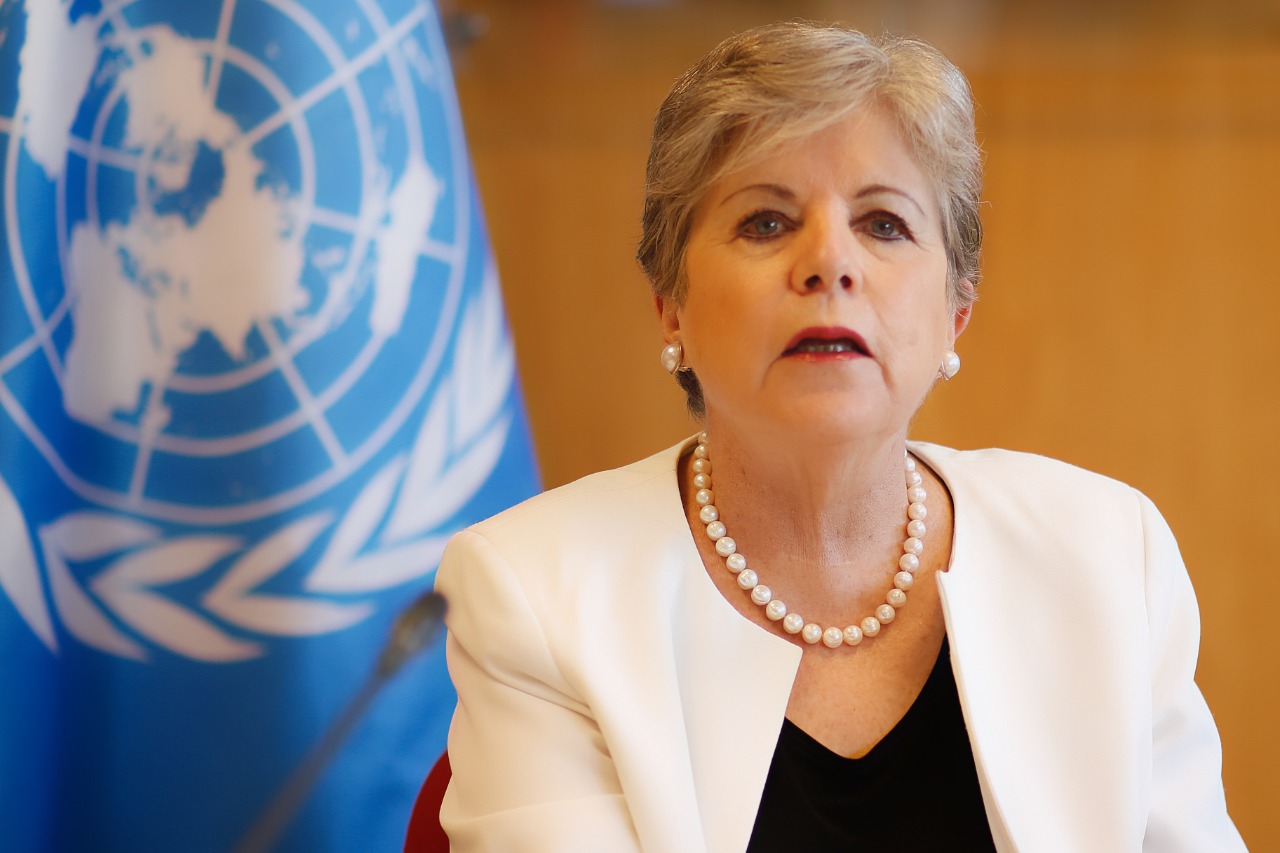Alicia Bárcena: Strengthened Inter-regional Cooperation on the Economy and Other Matters Would be a Great Boost for Achieving the Sustainable Development Goals
Work area(s)
ECLAC’s Executive Secretary participated in a high-level conference organized by UNCTAD and the permanent missions of Belarus and Barbados to the United Nations office in Geneva.

Inter-regional cooperation is an absolute must for achieving the Sustainable Development Goals (SDGs) and tackling the many and difficult challenges that confront the world today, Alicia Bárcena, Executive Secretary of the Economic Commission for Latin America and the Caribbean (ECLAC), indicated during a high-level international event organized by the United Nations Conference on Trade and Development (UNCTAD) and the permanent missions of Belarus and Barbados to the United Nations office in Geneva.
The event entitled “Harnessing inter-regional integration for the SDGs” brought together authorities such as Sergey Lavrov, Minister of Foreign Affairs of the Russian Federation; Vladimir Makei, Minister of Foreign Affairs of Belarus; Jerome Xavier Walcott, Minister of Foreign Affairs and Foreign Trade of Barbados; Isabelle Durant, Acting Secretary-General of UNCTAD; Ngozi Okonjo-Iweala, Director General of the World Trade Organization (WTO); and the Executive Secretaries of the five UN regional commissions: Alicia Bárcena (ECLAC), Olga Algayerova (United Nations Economic Commission for Europe, UNECE), Armida Salsiah Alisjahbana (Economic and Social Commission for Asia and the Pacific, ESCAP), Rola Dashti (Economic and Social Commission for Western Asia, ESCWA) and Vera Songwe (Economic Commission for Africa, ECA), among other prominent figures.
In her remarks on the panel entitled “Regional integration for a stronger multilateral economic system, tackling the COVID 19 challenges, and attaining the SDGs – experience and contribution of the international organizations,” Alicia Bárcena stated that strengthened inter-regional cooperation, in economic and other matters, would be a great boost for the achievement of the SDGs.
She recalled that the COVID-19 pandemic has had, and continues to have, a devastating effect in Latin America and the Caribbean, with a -7.1% drop in its Gross Domestic Product (GDP) in 2020, a sharp increase in poverty, and a marked deterioration in all social indicators.
“Therefore, economic recovery is essential, but not just any recovery. We need a transformative recovery which is greener, more inclusive, and which puts the region on a sustainable development path. We need to break with the region’s historical dependence on commodity exports by promoting new economic activities that are more knowledge-intensive, create more and better jobs, and have a lower environmental footprint,” she declared.
ECLAC’s Executive Secretary warned that there is concern over the steady erosion of intraregional trade in the last decade: while it reached its maximum level of 22% in 2008, in 2020 it notched just 12%, which is the lowest rate in the world. “Reversing the Latin America and Caribbean region’s trade and productive disintegration is crucial to support its recovery, and to move towards a more inclusive and sustainable development pattern. We need to generate endogenous growth engines through industrialization and reduce vulnerability to external shocks,” she emphasized.
Bárcena presented two proposals in this vein. The first is a call for productive diversification to move away from commodities and primarization, and to add value through innovation and technology with supply value chains that would enable better integration in global markets.
The second proposal is to foster intraregional productive integration and trade and inter-regional investment between, for example, Asia Pacific and Latin America and the Caribbean, or between North America and Latin America and the Caribbean. “China, for example, is the top trading partner for South America; that is why we should also take advantage of the free-trade agreement between Canada, the United States and Mexico to locate suppliers in countries closer to the target market (nearshoring) and relocate strategic productive and technological processes to the country of origin (reshoring),” she explained.
“There is enormous potential for exchanging knowledge and experiences at an inter-regional and intraregional level, both in the framework of Latin America and the Caribbean’s economic integration institutions as well as between this region and the rest of the world,” Alicia Bárcena insisted.
She also highlighted the case of Small and Medium-sized Enterprises (SMEs), which have been severely affected by the decline in intraregional trade, especially in the Caribbean, where trade and regional integration are crucial for achieving the SDGs. “We need to generate a structural transformation post-COVID-19 that is based on trade and integration. With its 650 million inhabitants, the Latin American and Caribbean market is a strategic asset with great untapped potential. Therefore, our countries should work together to attract Foreign Direct Investment (FDI) and to improve the region’s infrastructure,” she said.
Type
Country(ies)
- Latin America and the Caribbean
Contact
Public Information Unit
- prensa@cepal.org
- (56 2) 2210 2040